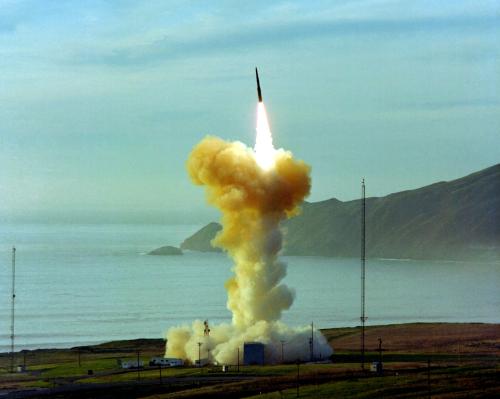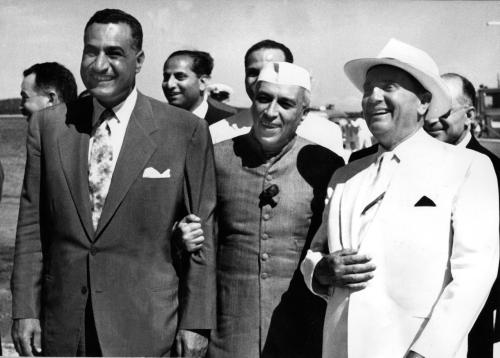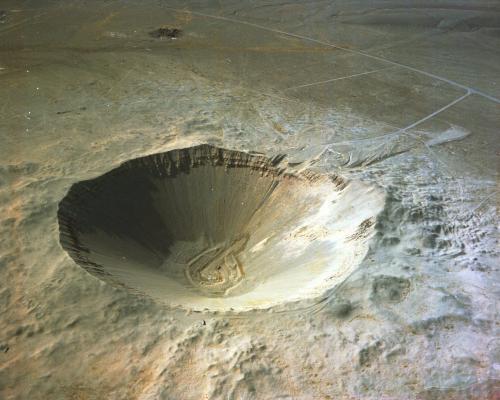On May 25, 2009, when the world was deeply shocked by the sad death of former South Korean President Roh Moo-hyun, North Korea (the Democratic People’s Republic of Korea or DPRK) conducted its second underground nuclear test which has drawn stern criticism in the international community. Although the North had made a public announcement weeks ago warning of a test, the event took place much sooner than outside analysts expected. The timing chosen by the North might have something to do with its intensified tough measures against the current South Korean government led by President Lee Myung-bak, who abandoned the “Sunshine Policy” that had been advocated and implemented by his two immediate predecessors. The fundamental reasons and logic of the North Korean nuclear issue including the second test, however, should be viewed through broader perspective. The North’s argument about the necessity of bolstering its nuclear deterrent was well explained in recent statements.
On April 29, 2009, two weeks after the United Nations Security Council (UNSC) adopted a unanimous presidential statement condemning North Korea’s “satellite” launch earlier in the month, the DPRK’s foreign ministry issued a strongly worded statement saying that the UNSC should promptly make an apology and withdraw all its resolutions regarding North Korea. The statement warned that in case the UNSC does not make an immediate apology, the DPRK will be compelled to take additional self-defense measures including nuclear tests, test-firings of intercontinental ballistic missiles, and make a decision to build a light water nuclear reactor and start the technological development for ensuring self-production of nuclear fuel as its first process without delay. In the same statement, the DPRK declared that “the desire for denuclearization of the Korean Peninsula has gone forever with the six-party talks and the situation is inching to the brink of war.”
This was the first statement issued by the North Korea government that officially announced further nuclear tests. Although threatening statements are all too common in North Korea’s outward announcements, the nuclear warning was not only a repeat of the stereotypical rhetoric. In the words of a commentary which appeared in Rodong Sinmun, North Korea’s official newspaper, on the same day, “it is a very narrow-minded view to misrepresent the crucial measure taken by the DPRK as brinkmanship and an action to pressurize someone.”
To a large extent, this statement demonstrated once again the DPRK’s strong political will as well as its technical readiness to continue its nuclear weapons program and become an independent nuclear power, after it conducted its first nuclear test in 2006. In fact, North Korea announced several days ago that it has restarted its nuclear activity by reprocessing the spent fuel rods in Yongbyon nuclear facility.
There is no doubt that the UNSC presidential statement prompted North Korea’s official announcement of further nuclear tests. The continuation of North Korea’s nuclear weapons program, however, should not be discussed only in the interactions between the UNSC and North Korea or in the Six-Party Talks (from which North Korea says it has withdrawn), but should be examined and understood in a more comprehensive and strategic context under which the DPRK has been compelled, even if partially by its own perceptions, to find an effective way to guarantee its political and economic survival, regardless of the dangers.
In this regard, the North Korea nuclear issue is quite unique if compared with the Iranian nuclear problem because Pyongyang has dual aims and objectives. In addition to the security and political objective, enlisting continuous economic assistance from the outside world became equally important and indispensable. In other words, the North’s nuclear program is intended not only to create a powerful military deterrent, but also to help sustain an otherwise weak economy by serving as leverage for continuous foreign aid. Such a unique paradigm has a paradoxical effect on efforts to resolve the nuclear standoff. It has enabled progress in the Six-Party Talks when combined with a flexible attitude from the United States, but it also encourages hardliners in Pyongyang to work against denuclearization which in turn may harden American attitudes.
To be more specific, the dual aims pursued by the DPRK’s nuclear program will have dual effects on the final diplomatic resolution of the problem. On the one hand, it gives hope to both the DPRK and the international community that a final deal is likely to be reached through negotiation, though both sides have been fully aware that it would be an uneasy task, simply because they would make gains in the process. On the other hand, at least for North Korea, the outcome of such negotiation should not be a once-and-for-all solution – not only because of the DPRK’s distrust of the United States and others but also because North Korea’s dual motivation makes it extremely difficult, if not entirely impossible, for Pyongyang to determine its final terms for a deal with others. In this context, even if a satisfactory security deal would be accepted by the DPRK (which is unlikely in the near term), it would also want the foreign economic aid for North Korea’s weak economy should last as long as possible if not forever.
Under such unique circumstances, the DPRK’s strong political will to develop nuclear weapons rests on plausible logic. The following five points will be helpful in explaining the main reasons why the country persists in pursuing nuclear weapons in defiance of the international will.
1. Defense
First, as the DPRK has frequently argued, its nuclear weapons program is a result of the more than five-decade long “hostile policy” taken by the United States toward the DPRK since the Korea War in the early 1950s. Although the DPRK has not clearly explained why it perceives a “hostile policy,” a formal peace treaty ending the Korean War and the establishment of diplomatic relations with the United States seem to be the minimum requirements for the DPRK to redefine its view of the U.S. policy. On May 8, 2009, the North Korean foreign ministry issued a statement blasting the “U.S. invariable hostile policy” toward the North. According to the statement, the essence of the “unchanged” and “persistent” U.S. hostile policy is “to eliminate [North Korea’s] ideology and bring down the system, both chosen by its people.” The conclusion of the statement was that the DPRK has no other choice but to “bolster its nuclear deterrent as it has already clarified.”
2. Shortage of options
Second, North Korea’s long-term isolation from the international community has limited its policy options and compelled the country to go nuclear. During the Cold War era, the DPRK was confronted not only with hostility from its enemies but also with the ups and downs within its own camp. In the post-Cold War era, the international environment for North Korea became even harder as its relations with both China and Russia entered into a delicate new era in which the political, security, and economic support from the two countries became less satisfactory, reliable, and sustainable. The new international environment forced the DPRK to be more independent. Although the DPRK succeeded in developing the Juche (self-reliance) thought as the policy manifestation of its independent spirit, the actual practice of security and economic independence were not as easy as expected. As a result, the emphasis on self-reliance brought up the practice of Songun (military first) politics for which the nuclear deterrent became necessary.
3. Asymmetric development
Third, the profoundly changed power balance on the Korean peninsula has forced the DPRK to develop nuclear weapons. While the DPRK’s economic productivity frequently faced natural disasters and systematic stagnation, South Korea’s “Han River economic miracle” has not only deeply hurt the national prestige of the DPRK but also made its national security and economic competitiveness even more vulnerable. In order to make up the disadvantageous position in the low politics of Korean peninsula, the DPRK has to demonstrate the superiority in the high politics, and, thus, to maintain a favorable position vis-à-vis Seoul for the future unification of the Korean peninsula.
4. Economic development
Fourth, Pyongyang believes that revitalizing its systematically stagnated economy depends largely on the successful development of its nuclear capacity. From North Korea’s vantage point, there is nothing more effective than the “nuclear card” by which to garner international attention and possibly large amounts of economic aid. Since the economy needs a continuous flow of foreign aid, it would be extremely difficult if not impossible for the DPRK to make a final deal with the U.S. others on its nuclear program, as such a deal may shut off this aid. This probably helps explain why the argument of abandoning the nuclear program for more economic benefits seems so meaningless for the DPRK in terms of its long term strategic consideration.
5. Big power aspirations
Finally, the long-held ambition of the DPRK leadership to be a big power entails the possession of nuclear weapons. From North Korea’s point of view, modern history shows that the whole Korean peninsula has long been bullied and sacrificed by big power competitions. Believing itself to be the legitimate representative of whole Korean peninsula, the DPRK has the political will and capability to become a strong military power which will not only be able to safeguard the peace and security of the Korean peninsula but also obtain an equal footing with other nuclear powers on the regional and global stage.
These five points suggest that as long as there is no dramatic change inside or outside the DPRK, the North Korean nuclear crisis will continue. Given the fact that the North Korea’s nuclear paradox has already become a political, security, and economic knot, it is more than obvious that it can not be resolved by hasty, insincere, and inconsistent diplomatic efforts. The contradictory policy toward North Korea taken by the Bush administration puzzled many countries in terms of the real intentions of the United States. With the Obama administration showing strong political willingness to lead a quest for a world free of nuclear weapons, it is the time for the international community to work closely with each other and deal with the North Korea’s nuclear crisis in a more cool-headed, cooperative and coordinated, consistent, patient, and persistent manner.
The Brookings Institution is committed to quality, independence, and impact.
We are supported by a diverse array of funders. In line with our values and policies, each Brookings publication represents the sole views of its author(s).



Commentary
Op-edNorth Korea’s Nuclear Paradox
May 27, 2009